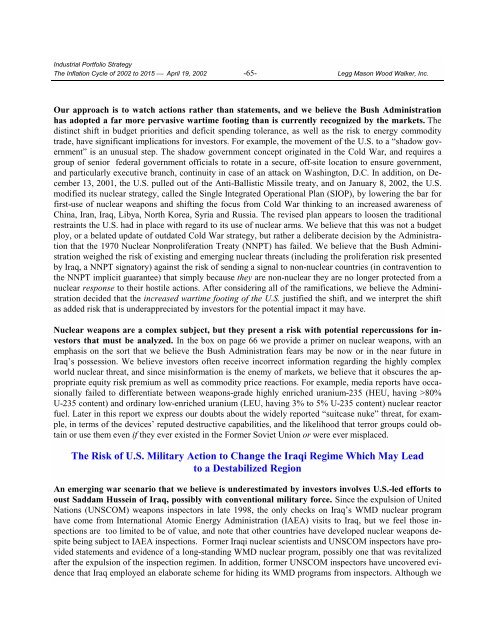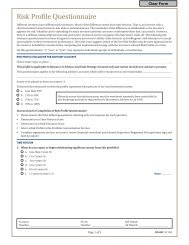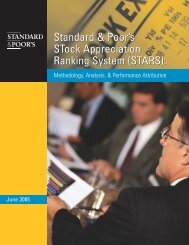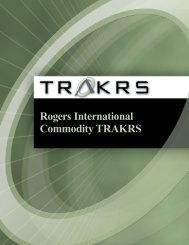The Inflation Cycle of 2002 to 2015 - Uhlmann Price Securities
The Inflation Cycle of 2002 to 2015 - Uhlmann Price Securities
The Inflation Cycle of 2002 to 2015 - Uhlmann Price Securities
Create successful ePaper yourself
Turn your PDF publications into a flip-book with our unique Google optimized e-Paper software.
Industrial Portfolio Strategy<br />
<strong>The</strong> <strong>Inflation</strong> <strong>Cycle</strong> <strong>of</strong> <strong>2002</strong> <strong>to</strong> <strong>2015</strong> ⎯ April 19, <strong>2002</strong> -65- Legg Mason Wood Walker, Inc.<br />
Our approach is <strong>to</strong> watch actions rather than statements, and we believe the Bush Administration<br />
has adopted a far more pervasive wartime footing than is currently recognized by the markets. <strong>The</strong><br />
distinct shift in budget priorities and deficit spending <strong>to</strong>lerance, as well as the risk <strong>to</strong> energy commodity<br />
trade, have significant implications for inves<strong>to</strong>rs. For example, the movement <strong>of</strong> the U.S. <strong>to</strong> a “shadow government”<br />
is an unusual step. <strong>The</strong> shadow government concept originated in the Cold War, and requires a<br />
group <strong>of</strong> senior federal government <strong>of</strong>ficials <strong>to</strong> rotate in a secure, <strong>of</strong>f-site location <strong>to</strong> ensure government,<br />
and particularly executive branch, continuity in case <strong>of</strong> an attack on Washing<strong>to</strong>n, D.C. In addition, on December<br />
13, 2001, the U.S. pulled out <strong>of</strong> the Anti-Ballistic Missile treaty, and on January 8, <strong>2002</strong>, the U.S.<br />
modified its nuclear strategy, called the Single Integrated Operational Plan (SIOP), by lowering the bar for<br />
first-use <strong>of</strong> nuclear weapons and shifting the focus from Cold War thinking <strong>to</strong> an increased awareness <strong>of</strong><br />
China, Iran, Iraq, Libya, North Korea, Syria and Russia. <strong>The</strong> revised plan appears <strong>to</strong> loosen the traditional<br />
restraints the U.S. had in place with regard <strong>to</strong> its use <strong>of</strong> nuclear arms. We believe that this was not a budget<br />
ploy, or a belated update <strong>of</strong> outdated Cold War strategy, but rather a deliberate decision by the Administration<br />
that the 1970 Nuclear Nonproliferation Treaty (NNPT) has failed. We believe that the Bush Administration<br />
weighed the risk <strong>of</strong> existing and emerging nuclear threats (including the proliferation risk presented<br />
by Iraq, a NNPT signa<strong>to</strong>ry) against the risk <strong>of</strong> sending a signal <strong>to</strong> non-nuclear countries (in contravention <strong>to</strong><br />
the NNPT implicit guarantee) that simply because they are non-nuclear they are no longer protected from a<br />
nuclear response <strong>to</strong> their hostile actions. After considering all <strong>of</strong> the ramifications, we believe the Administration<br />
decided that the increased wartime footing <strong>of</strong> the U.S. justified the shift, and we interpret the shift<br />
as added risk that is underappreciated by inves<strong>to</strong>rs for the potential impact it may have.<br />
Nuclear weapons are a complex subject, but they present a risk with potential repercussions for inves<strong>to</strong>rs<br />
that must be analyzed. In the box on page 66 we provide a primer on nuclear weapons, with an<br />
emphasis on the sort that we believe the Bush Administration fears may be now or in the near future in<br />
Iraq’s possession. We believe inves<strong>to</strong>rs <strong>of</strong>ten receive incorrect information regarding the highly complex<br />
world nuclear threat, and since misinformation is the enemy <strong>of</strong> markets, we believe that it obscures the appropriate<br />
equity risk premium as well as commodity price reactions. For example, media reports have occasionally<br />
failed <strong>to</strong> differentiate between weapons-grade highly enriched uranium-235 (HEU, having >80%<br />
U-235 content) and ordinary low-enriched uranium (LEU, having 3% <strong>to</strong> 5% U-235 content) nuclear reac<strong>to</strong>r<br />
fuel. Later in this report we express our doubts about the widely reported “suitcase nuke” threat, for example,<br />
in terms <strong>of</strong> the devices’ reputed destructive capabilities, and the likelihood that terror groups could obtain<br />
or use them even if they ever existed in the Former Soviet Union or were ever misplaced.<br />
<strong>The</strong> Risk <strong>of</strong> U.S. Military Action <strong>to</strong> Change the Iraqi Regime Which May Lead<br />
<strong>to</strong> a Destabilized Region<br />
An emerging war scenario that we believe is underestimated by inves<strong>to</strong>rs involves U.S.-led efforts <strong>to</strong><br />
oust Saddam Hussein <strong>of</strong> Iraq, possibly with conventional military force. Since the expulsion <strong>of</strong> United<br />
Nations (UNSCOM) weapons inspec<strong>to</strong>rs in late 1998, the only checks on Iraq’s WMD nuclear program<br />
have come from International A<strong>to</strong>mic Energy Administration (IAEA) visits <strong>to</strong> Iraq, but we feel those inspections<br />
are <strong>to</strong>o limited <strong>to</strong> be <strong>of</strong> value, and note that other countries have developed nuclear weapons despite<br />
being subject <strong>to</strong> IAEA inspections. Former Iraqi nuclear scientists and UNSCOM inspec<strong>to</strong>rs have provided<br />
statements and evidence <strong>of</strong> a long-standing WMD nuclear program, possibly one that was revitalized<br />
after the expulsion <strong>of</strong> the inspection regimen. In addition, former UNSCOM inspec<strong>to</strong>rs have uncovered evidence<br />
that Iraq employed an elaborate scheme for hiding its WMD programs from inspec<strong>to</strong>rs. Although we








